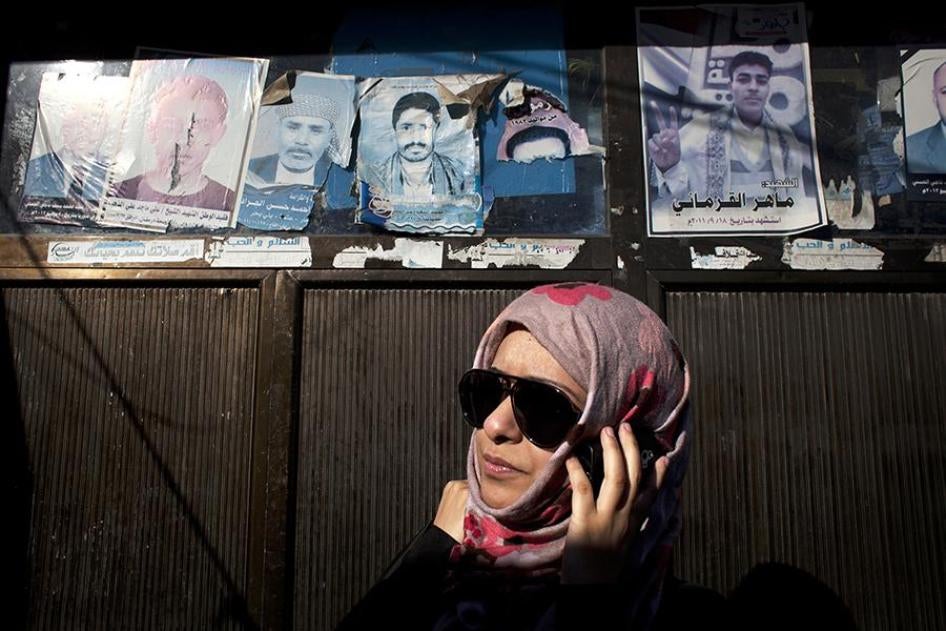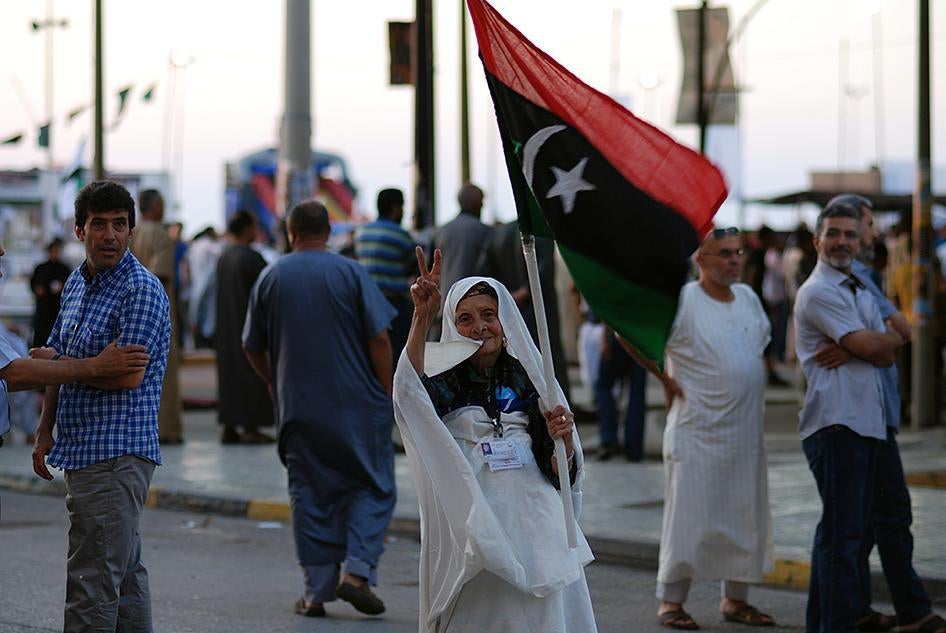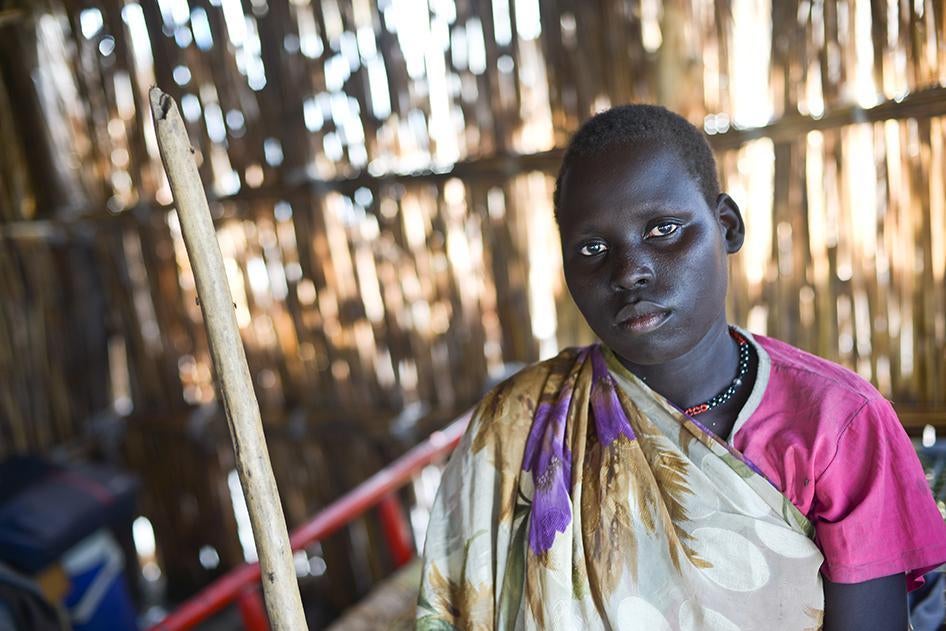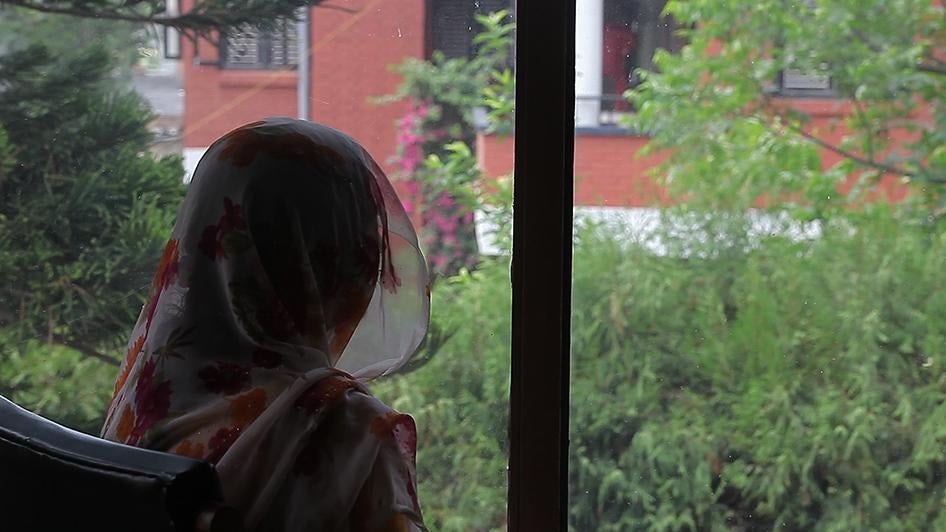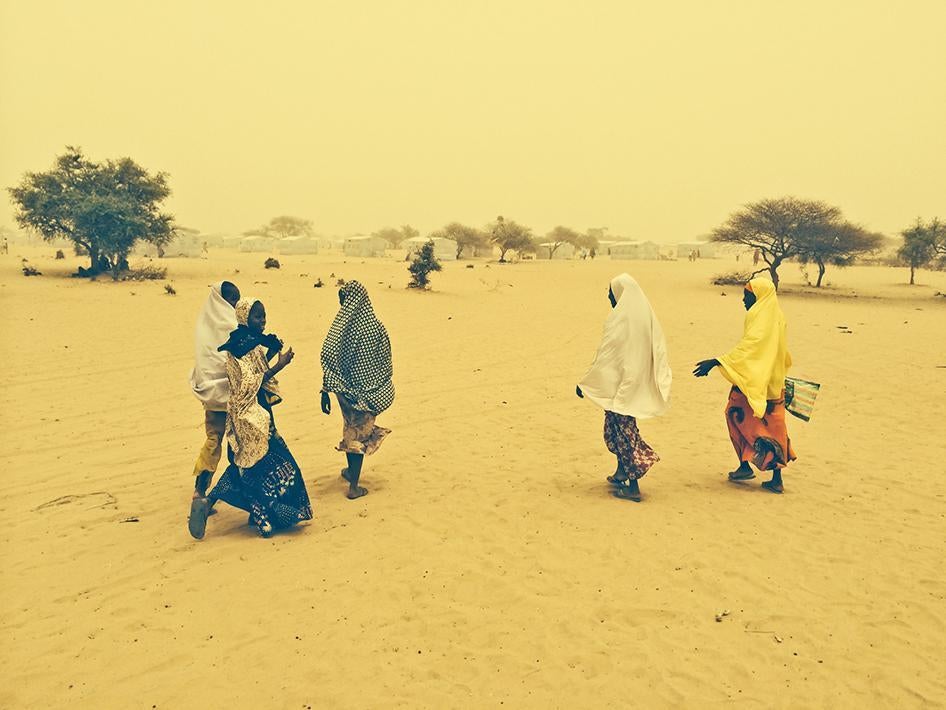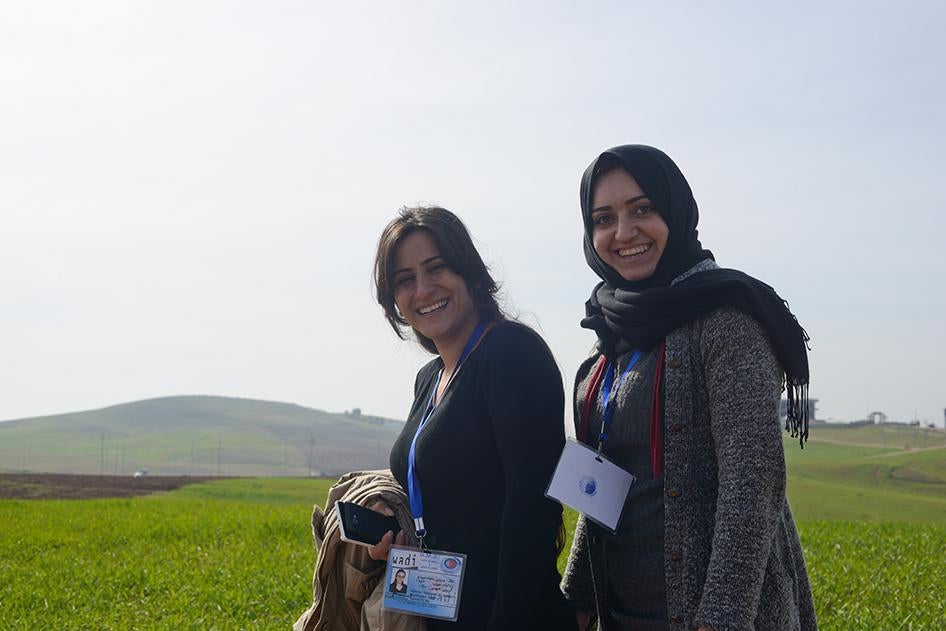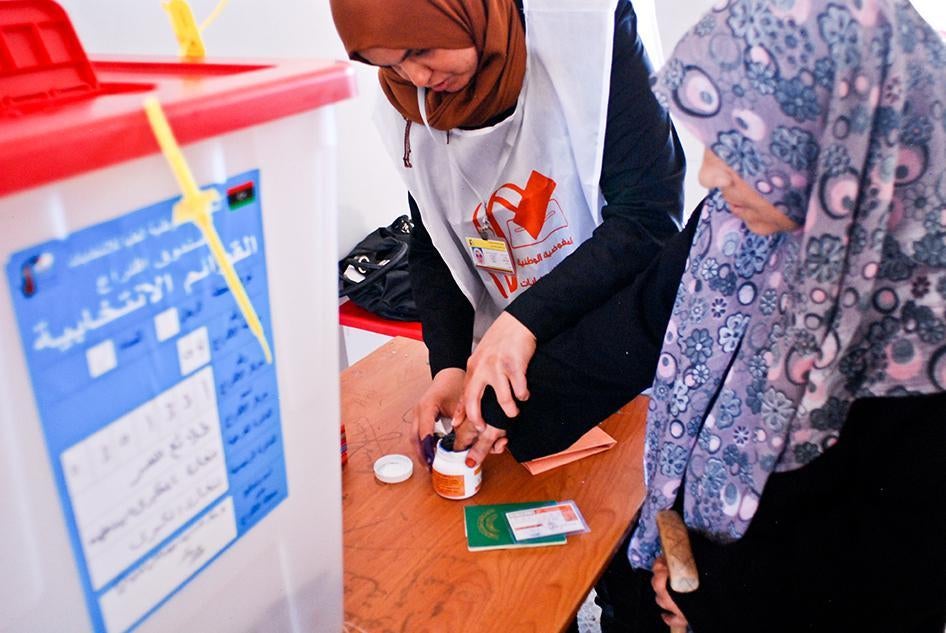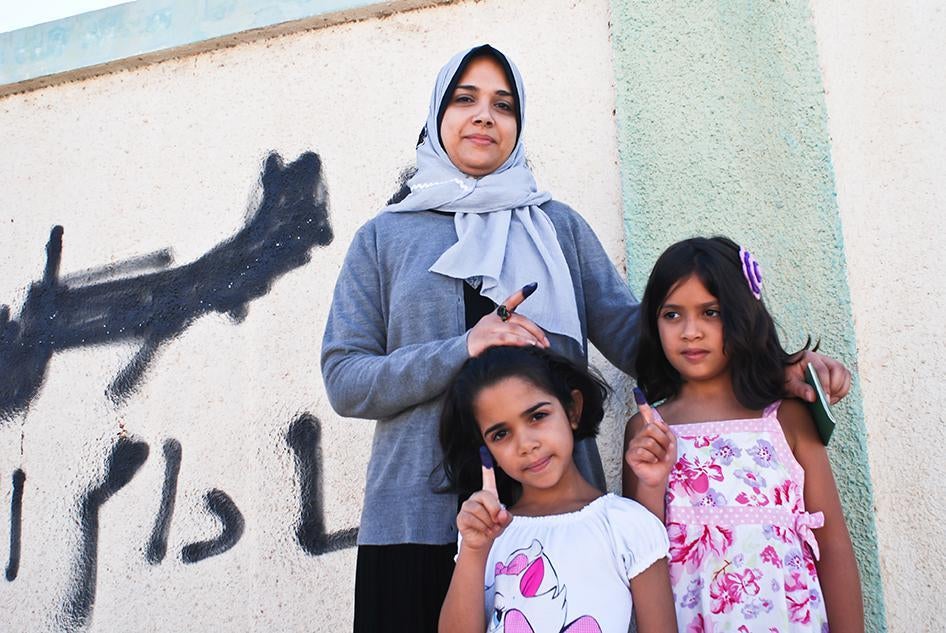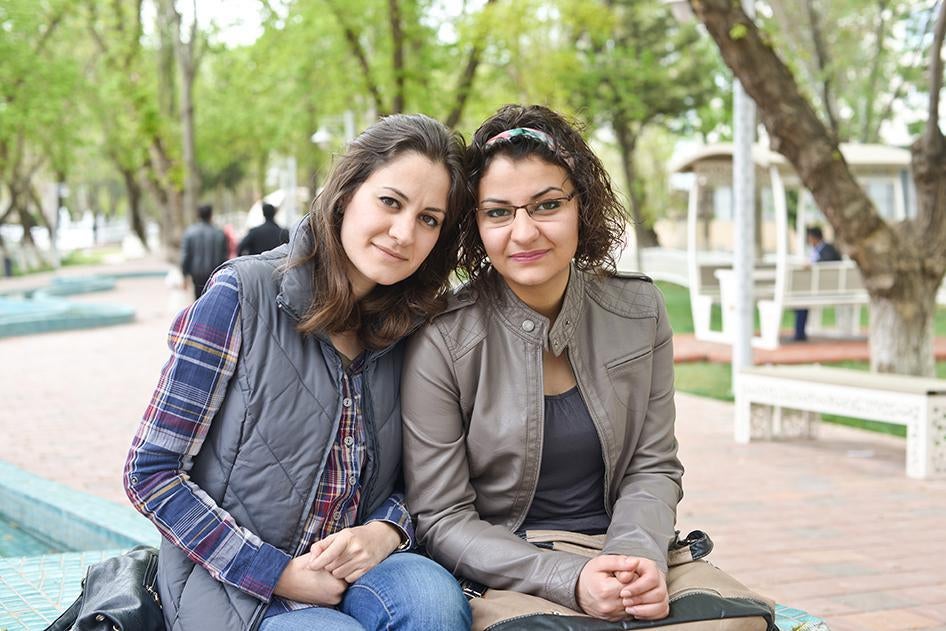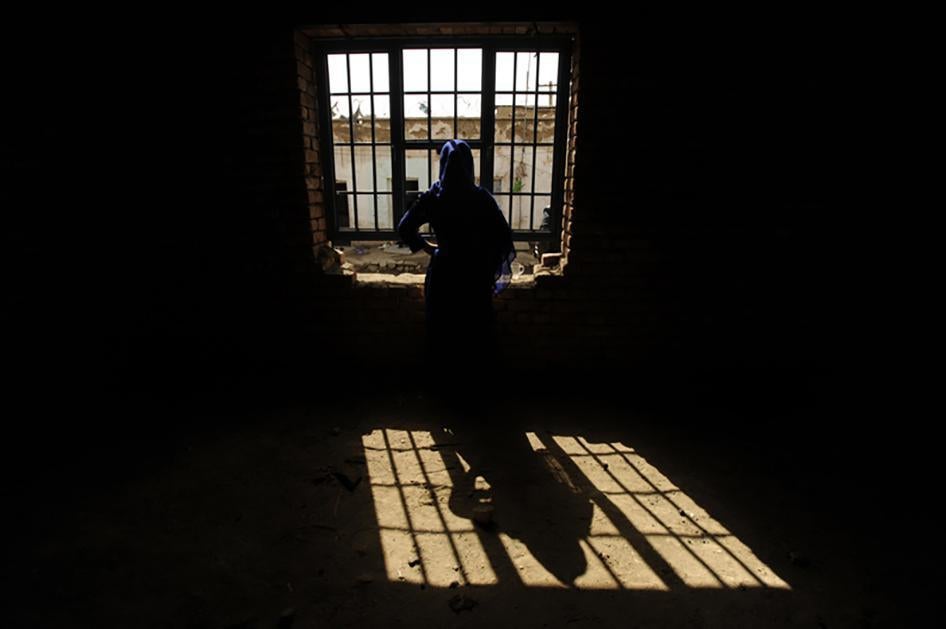The revolution made us proud to be there on the front line and men were forced to accept us. But now there are some who think it is time for women to go home.
—Salwa Bughaighis, lawyer and human rights activist, Benghazi, Libya, July 2012[i]
In 2011, women were at the forefront as the Arab Spring erupted in Libya, organizing and demanding their rights to have a voice in their country’s future. The ensuing civil war resulted in the former Libyan leader Muammar Gaddafi being toppled. In the transitional period following that armed conflict women organized as voters and candidates in preparation for elections, documented human rights abuses, and worked to ensure any new constitution would enshrine women’s rights.
Iman and Salwa Bughaighis—sisters and human rights activists—were among the key organizers of the first demonstrations against Gaddafi in Benghazi in February 2011. “The revolution was an earthquake to the cultural status of women in Libya,” Iman told Human Rights Watch.
Security Council Resolution 1325
After sustained advocacy efforts from women’s civil society organizations, the United Nations Security Council, in 2000, adopted Resolution 1325 on women, peace and security.[iii] It was the Security Council’s first dedicated resolution that recognized the specific risks to and experiences of women in armed conflict and women’s central role in maintaining international peace and security. Resolution 1325 elucidated states’ obligations to women and girls in situations of armed conflict, including ensuring that women are involved in all aspects of conflict prevention, conflict resolution, and post-conflict rebuilding. As broadly understood, the women, peace and security agenda acknowledges the linkages between participation, protection and assistance, and accountability, and the centrality of these issues to broader human rights concerns.
This groundbreaking resolution and the subsequent resolutions on women, peace and security elaborate the responsibilities of all parties to ensure the meaningful “participation of women in all levels of decision-making” in institutions and mechanisms for the prevention, management, and resolution of armed conflict, calling on all actors in peace talks to increase women’s participation in negotiations, and to ensure women’s rights are addressed in peace agreements.[iv] The resolutions remind all parties to armed conflicts of their obligations under international law, particularly civilian protection in armed conflicts, and call for states to end impunity for crimes of gender-based violence in armed conflicts. They urge the UN and governments to take steps to increase the number of women throughout the justice sector, and in armed forces. In these resolutions, the Security Council also states its intention to ensure it incorporates women, peace and security in its own work, including through consulting with civil society.
The resolution has given women around the world increased attention and legitimacy in their work in areas of armed conflict. Since the resolution’s adoption in 2000, many governments have begun to recognize that women’s roles in peace processes are not negotiable add-ons, but fundamental to sustainable and implementable peace accords. Security Council resolutions and commitments by UN member states have recognized conflict-related sexual violence as a tactic often ruthlessly deployed in war, and have expanded international prevention and response efforts. Governments and international bodies have introduced new policy frameworks, including additional Security Council resolutions, on women, peace and security at the national, regional, and multilateral levels. The UN is starting to collect data on a range of protection and participation aspects—from sexual violence in armed conflicts to women in peace talks—allowing policymakers and program implementers to begin to track where there has been success and where problems persist.
Much Work Remains
The remaining challenges are many. There is a lack of concerted, high-level leadership willing to spend political capital at key policy moments, such as in Security Council negotiations and in peace talks. There is insufficient and irregular funding, particularly for grassroots organizations working on women’s local-level peacebuilding and service provision.[v] Despite the improvement in data collection, there remains a lack of timely and disaggregated information for policymakers on women and girls in crisis situations, accompanied by a lack of analysis and recommendations for policymakers on appropriate action to take.[vi] Despite the heightened risk of violence faced by lesbian, gay, bisexual, and transgender (LGBT) individuals and women with disabilities in situations of armed conflict, specific measures for them are rarely incorporated into policy and programming, often leaving these populations out of decision-making processes and unable to access services.
The UN Security Council, despite six subsequent resolutions on women, peace and security, often fails to bring these issues into its work on crisis situations. Despite the Security Council members’ meeting with women civil society representatives on its 2013 visit to the Great Lakes region, the subsequent report on the mission contained no substantive analysis or recommendations on women’s rights and concerns.[vii] Briefings from senior UN officials often lack specific information on women’s rights violations, on the inclusion of women in peacemaking efforts, and on the levels of women’s participation in security reform. Use of sanctions and other tools at the Security Council’s disposal are similarly haphazardly applied with respect to women, peace and security.[viii] The Security Council rarely takes advantage of information on perpetrators to hold them to account and prevent future violations. For example, despite evidence of widespread crimes of sexual violence committed by Sudanese forces in Tabit in Darfur in 2014, the Security Council has not adopted a strong response.[ix]
With women’s rights high on their rhetorical agenda, practical support among donor countries lags. It is rare, for example, that donors make women’s rights and women’s participation in decision-making a priority in political engagement with conflict-affected countries. Too often, including in countries such as Afghanistan and Somalia, officials assert it is not the right time to push for women’s rights, that security is somehow a prerequisite for women’s rights rather than inextricably linked with them, or that they do not have the leverage to act.[x]
For women and girls living in situations of armed conflict, participation, protection and assistance, and accountability for gender-based crimes remain a distant promise. As detailed in the following sections, it will take strong action backed by persistent political will for the potential of the women, peace and security agenda to be realized.
Participation
When Afghan women were asked their definition of security, we used the word “amnyat wa masuniat,” by which we mean a comprehensive feeling of safety when engaged in daily public and social life. The success of peace agreements must be gauged by real, measurable security improvements for women and for all members of the community, not just that a peace agreement has been signed. Excellencies, peace is a process, not an event. We look to you as Member States, including members of the Security Council, to ensure that women are consistently appointed as mediators and negotiators, and that our rights are fundamental to peace processes and outcomes.
—Statement by Orzala Ashraf Nemat, Afghan civil society representative and women’s rights advocate, delivered in the UN Security Council on behalf of the NGO Working Group on Women, Peace and Security, New York, October 28, 2011[xi]
Despite years of rhetoric on the importance of women’s participation in Afghanistan peace processes, no women have been included in over 20 known rounds of informal talks between the international community and the Taliban. In talks between the Afghanistan government and the Taliban, women were present on two occasions.[xii] In most situations of armed conflict and post-conflict, women have few channels and face formidable obstacles to participating in conflict prevention, conflict-resolution, and political processes such as elections and constitutional reform.
Recommendations to Governments, Parties to Armed Conflict, UN agencies, and the UN Secretariat
- Implement national-level policies, including National Action Plans, on UN Security Council Resolution 1325, to ensure the full and meaningful participation of women in all peace and security discussions, including in all peace processes and transitional justice mechanisms. All parties involved in peace negotiations, including mediators and facilitators, should act to ensure women’s rights and concerns are a priority in negotiations and are integrated throughout any agreement. All discussions should benefit from the full engagement of civil society organizations, including women’s rights groups, women from marginalized populations, such as ethnic and religious minorities, and women with disabilities.
- Safeguard women’s security and support women’s participation in post-conflict elections, referendums and constitutional drafting, and reform processes. This includes promotion and protection of women candidates, voters, election workers, and women’s human rights defenders.
- Protect women’s human rights defenders. Governments should monitor threats and attacks against women's human rights defenders and provide protection as requested in a manner that allows them to continue their work.
- Strengthen recruitment and retention strategies for women in the security sector, including by addressing cultural and practical barriers that women face, by providing specific training and facilities, and ensuring women have equal opportunities for responsibility and advancement.
- Ensure women’s leadership and protection in displacement settings. Encourage and facilitate women’s representation in the leadership of camps and centers for the internally displaced and refugees. UN agencies should consult with women and girls, including those with disabilities, to ensure camp designs are accessible, safe, disability-inclusive, and provide equal access to food distributions, sanitation facilities, health—as well as reproductive health—services, education, and vocational training for women and girls.
Protection and Assistance
The government should give us proper shelter with a fence and an entrance. Police should secure the camp and manage who comes and goes. The worst thing is that the rapes push us into poverty because afterward we cannot do the same work or carry heavy loads. We need money for our kids to live. The government should do something or kids will die of hunger.
—Farxiyo, who was raped in an IDP camp, Mogadishu, Somalia, August 2013[xxiii]
No one has offered me one-on-one counselling of any kind. I’d be interested in receiving professional counseling to help me process my experiences if it was available.… I have trouble sleeping at night, and only sleep a few hours at a time. When I sleep, I often see my parents and siblings in front of my eyes, especially the image of my brothers being forced to kneel on the road, and my mother’s face.
—Narin (pseudonym), 20-year-old woman from Sinjar who escaped captivity and sexual abuse by ISIS fighters, Dohuk, Iraq, January 2015[xxiv]
In armed conflicts around the globe, combatants frequently target women and girls for abuse. National armies and non-state armed groups use sexual violence as a tactic in war in violation of international law. Conflict-related sexual violence can include rape, abduction, forced prostitution, forced marriage, sexual slavery, and forced pregnancy.
Women and girls face multiple abuses in war, in addition to conflict-related sexual violence, including: forced displacement; the targeting and punishment of women because of their own activism or activism by male relatives; the drive towards early, forced, and child marriages because of instability and a lack of security for girls and younger women; an increase in domestic violence and sexual violence committed by civilians; lack of access to food, shelter, and health care; the interruption of education; and sexual exploitation and trafficking, to name but a few.
For example, Human Rights Watch has documented the abuse faced by Syrian women activists and other civilians.[xxv] Some of these women have long histories of activism while others began participating politically only after the beginning of uprisings against the Syrian government. Some were targeted or arbitrarily detained for their work, such as Jelnar, who used her pharmaceutical credentials to smuggle medications between neighborhoods. Several of them experienced torture, sexual assault, physical abuse, or harassment as a direct result of their activism, like Layal, who was detained by government forces for assisting the internally displaced. Others became household heads following their husbands’ detention or death, such as Zeinab, who lost her husband and son in separate incidents at the hands of government forces.
In Sudan’s ongoing armed conflicts, Sudanese government forces and allied militias have committed rape and other sexual violence against women and girls on numerous instances. For example, Sudanese military forces engaged in the mass rape of more than 200 women and girls in the town of Tabit, Darfur, in late 2014, restricted access to the town for UN and international investigators, peacekeepers, and humanitarian agencies, and threatened residents with reprisals if they spoke about their ordeals. Government authorities fostered a climate of fear in Tabit that deterred many women and girls from seeking medical care at clinics and hospitals.[xxvi]
Adequate protection measures are vital to ensuring the safety of women and girls, but when attacks do happen, service provision is vital for survivors. In Nigeria, numerous victims and witnesses interviewed by Human Rights Watch expressed concern about the lack of security force presence in areas particularly vulnerable to attack by Boko Haram, notably in towns and villages in Borno State. Victims, witnesses, community leaders, and analysts told Human Rights Watch that government security services could have done more to prevent attacks by ensuring the adequate presence and arming of military personnel, and by responding more quickly and effectively to reports of attacks once in progress. Survivors of Boko Haram attacks received virtually no necessary psychosocial and medical services, and none of the rape survivors interviewed by Human Rights Watch had any information about how and where to access post-rape care.[xxvii]
In northern Iraq, the extremist group Islamic State (also known as ISIS) has carried out systematic rape and other sexual violence against Yezidi women and girls since August 2014. Human Rights Watch documented a system of mass abduction, organized rape and sexual assault, sexual slavery, and forced marriage by ISIS forces.[xxviii] Many of the women and girls remain missing, but survivors who escaped to the Kurdish Region of Iraq need psychosocial support and basic humanitarian assistance. These survivors require specialized and expert psychosocial services in their present locations to aid their recovery and their reintegration into their communities. Few have received these.
Women and girls in displaced populations are at increased risk of sexual and gender-based violence, and of becoming victims of sex and labor trafficking.[xxix] Humanitarian crises often mean that women and girls are placed at greater risk of violence, with specific measures such as camp design and humanitarian relief necessary. Human Rights Watch research has found that women and girls with disabilities were frequently abandoned or left behind in crises, condemning them to face isolation, neglect, and abuse in post-conflict settings.[xxx] Despite commitments from governments and the UN, prevention efforts, access to services, and holding perpetrators accountable all remain extremely weak, and in some cases, non-existent.
Women displaced by armed conflict often find it difficult to access necessary long-term protection and humanitarian assistance. In Colombia, in an example that highlights the complexity of long-term access to assistance, Lucia fled her community in Antioquia with her husband and six children when an armed group threatened her son for refusing to join their ranks in 2010. Lucia’s husband had physically abused her and this became worse after the family fled to Medellín. Despite trying to access humanitarian assistance for herself and her children directly, the government agency never responded to her case. [xxxi]
Women with disabilities in displacement settings also face discrimination on the basis of gender, disability, and poverty, and thus need particular measures to address protection concerns.[xxxii] Lack of mobility and communication barriers, for example, mean women with disabilities are at particular risk of sexual violence. This discrimination, as well as more general social stigma, prevents them from realizing their rights to accessible information, and accessing health care and other government services. In a displacement camp in Northern Uganda, Charity, a woman with a physical disability, recounted her experience: “People told me I should just die so others can eat the food: ‘You are useless. You are a waste of food.’”[xxxiii]
In line with their obligations under international humanitarian law—the laws of war—parties to armed conflicts should take all feasible measures to protect civilians under their control from attack, including protecting women and girls from sexual and other gender-based violence.[xxxiv] International human rights law also applies during armed conflict, and provides protections to women and girls against sexual violence and other abuses, including domestic violence.[xxxv] States have obligations to investigate credible allegations of war crimes and other serious human rights abuses and prosecute those responsible.
International humanitarian and human rights law prohibit acts of sexual violence. International humanitarian law sets out protections for civilians and other non-combatants during both international and non-international armed conflicts.[xxxvi] It implicitly and explicitly prohibits both state armed forces and non-state armed groups from committing rape and other forms of sexual violence.[xxxvii]
International human rights law also contains protections from rape and other forms of sexual abuse through its prohibitions on torture and other ill-treatment, slavery, forced prostitution, and discrimination based on sex.[xxxviii] The Convention on the Rights of the Child contains additional protections for children.[xxxix]
Recommendations to Governments, Parties to Armed Conflicts, UN agencies, and the UN Secretariat
- Comply with international humanitarian law and human rights law prohibitions of rape and other forms of sexual violence, sexual slavery, cruel treatment, and other abuses. All parties to armed conflicts should issue clear, public orders to all forces under their control to end and appropriately punish all abuses, including crimes of sexual and gender-based violence.
- Governments providing military and other security assistance should ensure that such support does not encourage or facilitate abuses against women, and that it provides a basis for promoting greater respect for women’s rights. Compliance with international human rights standards should be a factor in evaluating the continuation of such support. Governments should vet recipients of this assistance to exclude units or individuals when there is credible information they have been involved in serious violations of human rights.
- Ensure that survivors of sexual violence and other gender-based violence have access to essential medical and psychological care, as well as available economic and social support. Humanitarian aid should include access to the full range of sexual and reproductive health services that respect the confidentiality and rights of survivors, including for pregnancy, termination of pregnancy, and injuries resulting from sexual violence, with specific measures taken to ensure these services are accessible for women with disabilities.
- Make women’s and girls’ protection and access to assistance a priority in displacement settings, including through consultation, promoting women’s leadership, camp and shelter design, registration and distribution systems, security measures, and recruitment and training of female security staff.
- Ensure all parties to armed conflicts grant UN agencies and independent humanitarian organizations unfettered access to civilians and communities in need of assistance. The media and human rights groups should also be provided access to conflict areas.
- Governments and the UN should highlight women’s participation, protection, and assistance concerns at the highest levels, including by conducting high-level visits to areas where serious abuses have been reported and raising the issues with senior government officials, donor governments, and regional and international bodies. Security Council members should press all parties to armed conflicts to meet all international law obligations.
- The UN Security Council and concerned governments should impose arms embargoes on state armed forces and non-state armed groups implicated in widespread or systematic serious human rights abuses, including those targeting women and girls. The Security Council should require states to suspend all military sales and assistance, including technical training and services, to these abusive actors until meaningful steps are taken to end such violations and appropriately punish those responsible. Travel bans and asset freezes should also be imposed on individuals responsible for serious abuses, with appropriate due process protections.
Accountability
We want these people punished. We just don’t have the reach or the power. If I did, we would have dealt with it a long time ago. We need support.
—Husband of Nandita (pseudonym), who was raped in 2001 because her husband was a Maoist combatant, Nepal, April 2014[xl]
Perpetrators of abuses in armed conflicts rarely face justice and, by all accounts, are even less likely to when responsible for sexual violence against women and girls. In November 2012, in Minova, Democratic Republic of Congo, Congolese army soldiers raped at least 76 women and girls when nearby Goma fell to the M23 rebel group.[xli] The crimes created an outcry at the national and international level. Strong international pressure was brought on the Congolese authorities to pursue justice. The UN threatened to suspend support by the peacekeeping mission MONUSCO to the Congolese army unless those responsible were brought to justice. The UN Security Council and donor governments raised the need for accountability for the crimes in Minova in multiple statements and in meetings with Congolese authorities. High-profile visits to the area by the Congolese minister of justice, the wife of President Joseph Kabila, UK Foreign Minister William Hague, and UN refugee agency special envoy Angelina Jolie, raised attention to the issue.
Three years after the attacks, accountability, services, and security are still insufficient. Despite considerable efforts by Congolese authorities and international partners to ensure judicial proceedings in the case, including by providing for the participation of numerous victims and effective protection of victims and witnesses, the verdict did little to achieve justice. Out of 39 soldiers and officers brought to trial, only 2 rank-and-file soldiers were convicted of rape. All mid-ranking officers present in Minova at the time of the crimes and brought to trial were completely acquitted. No high-level officers were even charged.[xlii]
The Minova case illustrates the difficulties of ensuring accountability for conflict-related sexual violence. Congolese authorities and international partners have made considerable efforts to increase accountability for sexual violence in Congo over the past several years, resulting in a few trials involving charges of rape as a war crime or a crime against humanity, and dozens of proceedings and convictions for rape as an ordinary crime. Investigating and proving sexual violence in judicial proceedings remains a complex matter and further efforts are needed.
Women and girls who suffer rights abuses in armed conflicts, including sexual violence, face tremendous barriers in obtaining redress. Regular police and court functions may be in disarray. They may not wish to seek avenues for justice out of fear of retaliation or marginalization in their communities and homes. They may lack the financial or logistical means to access courts and legal assistance. National judicial systems often lack expertise in handling vulnerable victims of sexual violence during investigations and prosecutions. Physical protection and psychological assistance may be lacking. There may be strong resistance to or lack of resources for reforming the security apparatus in the immediate and long-term aftermath of an armed conflict. Disarmament, demobilization, and reintegration programs often neglect to address female combatants and women euphemistically called “bush wives,” or women who are associated with armed groups, often forcibly. Women with disabilities have particular difficulty accessing redress or justice mechanisms, including physical barriers in entering police stations and courtrooms, communication barriers, or questioning of the credibility of their testimony if they have a psychosocial or intellectual disability.
Even when international peacekeeping forces are in place to bring stability to conflict-riven regions, they are sometimes perpetrators themselves. Although the UN has a “zero tolerance” policy on sexual exploitation and abuse, accountability for these crimes remains a concern.[xliii] For example, in the past decade, there have been allegations of sexual exploitation and abuse in peacekeeping missions in the Central African Republic, Haiti, Somalia, and the Democratic Republic of Congo. The persistent lack of transparency on these cases makes it very difficult to help victims seek justice. With the UN historically providing few specifics on allegations of abuse, and few countries that contribute troops and police to UN operations providing information on investigations and prosecutions, the scope of the problem is unclear. In one of the few cases in which public information is available on accountability for UN peacekeepers, a Pakistani peacekeeper charged with sexually assaulting a Haitian boy was convicted, and faced a one-year sentence upon conviction.[xliv]
When crimes of sexual violence are committed as part of armed conflict, they can be prosecuted as war crimes. States have an obligation to investigate alleged war crimes committed by members of the armed forces and other nationals, and prosecute those responsible.[xlv] Non-state armed groups also have an obligation to prevent war crimes and should investigate and appropriately punish perpetrators.[xlvi] Those acts of sexual violence committed as part of a widespread or systematic attack against a civilian population may amount to crimes against humanity. The Rome Statute of the International Criminal Court (ICC) specifies that acts of rape, sexual slavery, enforced prostitution, forced pregnancy, enforced sterilization, or any other form of sexual violence of comparable gravity can constitute war crimes or crimes against humanity.[xlvii]
Aside from their direct criminal responsibility for crimes committed, for instance, by issuing orders that subordinates carry out, commanders and other superiors may be criminally liable for failing to prevent or punish crimes committed by their subordinates.[xlviii]
International human rights law also enshrines the right to an effective remedy, which obligates the state to prevent, investigate, and punish serious human rights violations.[xlix] State should also provide reparations to victims of human rights violations, such as compensation for damages.[l] The UN has reaffirmed these principles specifically in relation to eliminating violence against women.[li]
Recommendations to Governments, UN agencies, and the UN Secretariat
- Ensure comprehensive, credible, and impartial investigations into sexual and gender-based violence and appropriately and fairly prosecute those responsible. This should include independent investigations into all allegations against members of armed forces, including peacekeepers, that respect the confidentiality and rights of survivors.
- Ensure accessible judicial processes that adhere to international fair trial standards for grave international crimes, including sexual and gender-based violence. This should include providing specialized training to investigators, prosecutors, and judges on the proper handling of such cases. Adequate protection measures and psychological support should be available, before, during, and after trials, including, but not limited to, relocation measures for victims and their households. Judicial mechanisms should also be accessible for women with disabilities, including by facilitating access to police stations and courts, ensuring access to documentation, and relevant training for law enforcement and the judiciary.
- Strengthen independent institutions capable of responding to sexual and gender-based violence and supporting survivors. Governments should create accessible and safe channels to report rape, assault, and other abuses and issue clear, public orders to all security forces to end any harassment, intimidation, and arbitrary arrests of those who speak out or seek to enforce their rights. Reporting mechanisms should be fully inclusive and provide specific accommodations for women and girls with disabilities. Governments should ensure proper and timely investigations and prosecutions that respect the rights of the survivor.
- Enact security sector reform to provide vetting of police and other security personnel, ensure recruitment, hiring, and training of female security personnel, and provide training for prosecutors, as well as judges and defense lawyers, on respecting women’s rights in the justice system, including handling crimes of sexual violence. Identify and exclude individuals from the security forces who are under investigation, have charges pending against them, or have been subjected to disciplinary measures or criminal convictions for sexual violence or other serious abuses.
- Press for accountability and justice, including through the UN Security Council, General Assembly, and Human Rights Council. When national level efforts fail or are inadequate, pursue alternative paths to justice, such as independent commissions of inquiry, the use of universal jurisdiction, and when applicable, referrals to the ICC. In accordance with the ICC prosecutor’s newly adopted Policy Paper on Sexual and Gender-Based Crimes, the ICC should continue to ensure that these crimes are the focus of special attention in ICC proceedings.[lii]
- Ensure reparations programs meet international standards and include specific consideration for women and girls. Consult with local women’s rights groups and women from communities affected by armed conflict in determining and distributing reparation packages.
- Protect women’s rights in national laws and ensure they meet international standards. This includes ratifying the Convention on the Elimination of All Forms of Discrimination against Women (CEDAW) with no reservations, or removing any existing reservations to CEDAW. National laws should guarantee equality before the law, protection from violence, and freedom from discrimination, including on the basis of sex, gender, pregnancy, disability, and marital status. Consistent with international standards, sexual violence and other gender-based violence crimes should be included in the criminal code. Ensure accountability when these laws are violated.
- Institute measures to ensure accountability, including by raising public concern and urging relevant actors, including troop-contributing countries, to carry out immediate investigations when there are substantial grounds to believe that peacekeepers have committed serious human rights abuses or war crimes, including sexual exploitation and abuse.
[i] Human Rights Watch, A Revolution for All: Women’s Rights in the New Libya, May 2013, https://www.hrw.org/report/2013/05/27/revolution-all/womens-rights-new-libya, p. 11.
[ii] “Libya: Extremists Terrorizing Derna Residents,” Human Rights Watch news release, November 27, 2014, https://www.hrw.org/news/2014/11/27/libya-extremists-terrorizing-derna-residents.
[iii] United Nations Security Council, Resolution 1325 (2000), S/RES/1325 (2000) http://www.un.org/en/ga/search/view_doc.asp?symbol=S/RES/1325(2000) (accessed July 21, 2015).
[iv] United Nations Security Council, Resolution 1820 (2008), S/RES/1820 (2008) http://www.un.org/en/ga/search/view_doc.asp?symbol=S/RES/1820(2008) (accessed July 21, 2015); United Nations Security Council, Resolution 1888 (2009), S/RES/1888 (2009) http://www.un.org/en/ga/search/view_doc.asp?symbol=S/RES/1888(2009) (accessed July 21, 2015); United Nations Security Council, Resolution 1889 (2009), S/RES/1889 (2009) http://www.un.org/en/ga/search/view_doc.asp?symbol=S/RES/1889(2009) (accessed July 21, 2015); United Nations Security Council, Resolution 1960 (2010), S/RES/1960 (2010) http://www.un.org/en/ga/search/view_doc.asp?symbol=S/RES/1960(2010) (accessed July 21, 2015); United Nations Security Council, Resolution 2106 (2013), S/RES/2106 (2013) http://www.un.org/en/ga/search/view_doc.asp?symbol=S/RES/2106(2013) (accessed July 21, 2015); United Nations Security Council, Resolution 2122 (2013), S/RES/2122 (2013) http://www.un.org/en/ga/search/view_doc.asp?symbol=S/RES/2122(2013) (accessed July 21, 2015).
[v] According to the 2014 Secretary-General’s report on women, peace and security, data compiled by the Organization for Economic Cooperation and Development shows that “only 0.35 per cent of aid allocated to conflict, peace and security activities [was] marked as having a gender focus.” United Nations Security Council, Report of the Secretary-General on women and peace and security, S/2014/693, September 2014, http://www.securitycouncilreport.org/atf/cf/%7B65BFCF9B-6D27-4E9C-8CD3-CF6E4FF96FF9%7D/s_2014_693.pdf (accessed July 17, 2015).
[vi] Based on data from: NGO Working Group on Women, Peace and Security, “Mapping Women, Peace and Security in the UN Security Council: 2012-2013,” December 2013, http://womenpeacesecurity.org/media/pdf-2012-13_MAP_Report.pdf (accessed July 8, 2015); and Women’s International League for Peace and Freedom, PeaceWomen, “Report Watch,” undated, http://www.peacewomen.org/security-council/report-watch (accessed July 8, 2015).
[vii] United Nations Security Council, Sixty-eighth year, 7045th meeting, October 21, 2013, http://www.un.org/ga/search/view_doc.asp?symbol=S/PV.7045 (accessed July 8, 2015).
[viii] Based on data from: NGO Working Group on Women, Peace and Security, “Mapping Women, Peace and Security in the UN Security Council: 2012-2013”; Women’s International League for Peace and Freedom, PeaceWomen, “Report Watch”; and Security Council Report, “Cross Cutting Report: Women, Peace and Security,” April 2014, http://www.securitycouncilreport.org/atf/cf/%7B65BFCF9B-6D27-4E9C-8CD3-CF6E4FF96FF9%7D/cross_cutting_report_2_women_peace_security_2014.pdf (accessed July 8, 2015).
[ix] Human Rights Watch, Mass Rape in North Darfur: Sudanese Army Attacks against Civilians in Tabit, February 2015, https://www.hrw.org/report/2015/02/11/mass-rape-north-darfur/sudanese-army-attacks-against-civilians-tabit.
[x] Heather Barr, “A seat at the table in Afghanistan,” Washington Post, May 1, 2015, http://www.washingtonpost.com/opinions/a-seat-at-the-table-in-afghanistan/2015/05/01/fd930e26-ef41-11e4-8abc-d6aa3bad79dd_story.html (accessed July 16, 2015).
[xi] Statement by Orzala Ashraf Nemat at the UN Security Council Open Debate on Women, Peace and Security, October 28, 2011, http://womenpeacesecurity.org/media/pdf-Statement_OpenDebate_Oct2011.pdf (accessed July 16, 2015).
[xii] Oxfam “Behind Closed Doors: The risk of denying women a voice in determining Afghanistan’s future,” November 24, 2014, https://www.oxfam.org/sites/www.oxfam.org/files/file_attachments/bp200-behind-doors-afghan-women-rights-241114-en.pdf (accessed July 16, 2015).
[xiii] See UN Women, “Women’s Participation in Peace Negotiations: Connections between Presence and Influence,” October 2012, http://www.unwomen.org/~/media/headquarters/attachments/sections/library/publications/2012/10/wpssourcebook-03a-womenpeacenegotiations-en.pdf (accessed July 20, 2015); and United Nations Security Council, Report of the Secretary-General on Women and Peace and Security, S/2011/598, September 29, 2011, http://www.un.org/en/ga/search/view_doc.asp?symbol=S/2011/598 (accessed July 27, 2015); S/2012/732, October 2, 2012, http://www.un.org/en/ga/search/view_doc.asp?symbol=S/2012/732 (accessed July 27, 2015); S/2013/525, September 4, 2013, http://www.un.org/en/ga/search/view_doc.asp?symbol=S/2013/525 (accessed July 27, 2015); and S/2014/693, September 23, 2014, http://www.un.org/en/ga/search/view_doc.asp?symbol=S/2014/693 (accessed July 27, 2015). See also, Christine Bell and Catherine O’Rourke, Women and Peace Agreements 1325 Dataset, Distributed by University of Ulster, Transitional Justice Institute, 2010 http://www.transitionaljustice.ulster.ac.uk/tji_database.html (accessed July 20, 2015).
[xiv] “Women take the reins to build peace in Colombia”, UN Women press release, May 28, 2015, http://www.unwomen.org/en/news/stories/2015/5/women-build-peace-in-colombia (accessed July 16, 2015).
[xv] Women’s International League for Peace and Freedom, “Innovative WILPF Conference Gathers Syrian And Bosnian Women’s Rights Activists,” February 21, 2014, http://www.wilpfinternational.org/innovative-wilpf-conference-gathers-syrian-and-bosnian-womens-rights-activists-2/ (accessed July 16, 205); Cynthia Enloe, “Day I of the Syrian Women’s Peace Talks in Geneva: Prelude to the Official Syrian Peace Talks,” Women’s Action for New Directions, January 20, 2014, http://www.wandactioncenter.org/2014/01/30/guest-author-cynthia-enloes-report-from-the-syrian-peace-talks/ (accessed July 16, 2015).
[xvi] “He Left Before Syria’s Women Could Speak,” Human Rights Watch Dispatch, December 19, 2013, https://www.hrw.org/news/2013/12/19/dispatches-he-left-syria-s-women-could-speak (accessed July 16, 2015).
[xvii] UNSCR 1888, Operative Paragraph 17; UNSCR 1820, Operative Paragraph 10; United Nations Disarmament, Demobilization and Reintegration Resource Centre (UNDDR), Integrated Disarmament, Demobilization and Reintegration Standard, “5:10, Women, Gender and DDR,” August 2006, http://unddr.org/uploads/documents/IDDRS%205.10%20Women,%20Gender%20and%20DDR.pdf (accessed 21 July 2015).
[xviii] United Nations Security Council, Resolution 1325, Operative Paragraph 12.
[xix] “UN Human Rights Council: Call to Recognize the Status of Women's Human Rights Defenders,” Human Rights Watch Oral Statement during the Annual Day of Discussion on Women's Human Rights, June 26, 2012, https://www.hrw.org/news/2012/06/26/un-human-rights-council-call-recognize-status-womens-human-rights-defenders.
[xx] “Sudan: Surge in Detention, Beatings, Around Elections,” Human Rights Watch news release, April 28, 2015, https://www.hrw.org/news/2015/04/28/sudan-surge-detention-beatings-around-elections.
[xxi] “Afghanistan: Urgent Need for Safe Facilities for Female Police,” Human Rights Watch news release, April 25, 2013, https://www.hrw.org/news/2013/04/25/afghanistan-urgent-need-safe-facilities-female-police.
[xxii] “Afghanistan: Surge in Women Jailed for ‘Moral Crimes,’” Human Rights Watch news release, May 21, 2015, https://www.hrw.org/news/2013/05/21/afghanistan-surge-women-jailed-moral-crimes.
[xxiii] Human Rights Watch, “Here, Rape is Normal”: A Five-Point Plan to Curtail Sexual Violence in Somalia, February 2014, https://www.hrw.org/report/2014/02/13/here-rape-normal/five-point-plan-curtail-sexual-violence-somalia.
[xxiv] “Iraq: ISIS Escapees Describe Systematic Rape,” Human Rights Watch news release, April 14, 2015, https://www.hrw.org/news/2015/04/14/iraq-isis-escapees-describe-systematic-rape.
[xxv] Human Rights Watch, “We are Still Here”: Women on the Front Lines of Syria's Conflict, July 2014, https://www.hrw.org/report/2014/07/02/we-are-still-here/women-front-lines-syrias-conflict.
[xxvi] “Sudan: Soldiers, Militias Killing, Raping Civilians,” Human Rights Watch news release, December 14, 2014, https://www.hrw.org/news/2014/12/14/sudan-soldiers-militias-killing-raping-civilians; “Sudan: Mass Rape by Army in Darfur,” Human Rights Watch news release, February 11, 2015, https://www.hrw.org/news/2015/02/11/sudan-mass-rape-army-darfur.
[xxvii] Human Rights Watch, “Those Terrible Weeks in their Camp”: Boko Haram Violence against Women and Girls in Northeast Nigeria, October 2014, https://www.hrw.org/report/2014/10/27/those-terrible-weeks-their-camp/boko-haram-violence-against-women-and-girls.
[xxviii] “Iraq: ISIS Escapees Describe Systematic Rape,” Human Rights Watch news release, April 14, 2015, https://www.hrw.org/news/2015/04/14/iraq-isis-escapees-describe-systematic-rape.
29 United Nations Security Council, Report of the Secretary-General on women and peace and security, S/2014/693, p. 19.
[xxx] Human Rights Watch, “As if We Weren’t Human”: Discrimination and Violence against Women with Disabilities in Northern Uganda, August 2010, https://www.hrw.org/report/2010/08/26/if-we-werent-human/discrimination-and-violence-against-women-disabilities-northern.
[xxxi] Human Rights Watch, Rights Out of Reach: Obstacles to Health, Justice, and Protection for Displaced Victims of Gender-Based Violence in Colombia, November 2012, https://www.hrw.org/report/2012/11/14/rights-out-reach/obstacles-health-justice-and-protection-displaced-victims-gender, p. 5.
[xxxii] World Bank and World Health Organization, “World Report on Disability,” 2011, http://whqlibdoc.who.int/publications/2011/9789240685215_eng.pdf (accessed July 21, 2015), p. 8.
[xxxiii] Human Rights Watch, “As if We Weren’t Human.”
[xxxiv] See International Committee of the Red Cross (ICRC), Customary International Humanitarian Law (Cambridge, UK: Cambridge University Press, 2005), rule 22, citing Protocol I, art. 58(c) and rule 93 (prohibiting rape and other forms of sexual violence).
[xxxv] The International Covenant on Civil and Political Rights (ICCPR) prohibits torture and other cruel, inhuman, or degrading treatment (art. 7) and protects women’s right to be free from discrimination based on sex (arts. 2(1) and 26). ICCPR, adopted December 16, 1966, G.A. Res. 2200A (XXI), 21 U.N. GAOR Supp. (No. 16) at 52, U.N. Doc. A/6316 (1966), 999 U.N.T.S. 171, entered into force March 23, 1976; Convention against Torture and Other Cruel, Inhuman or Degrading Treatment or Punishment, adopted December 10, 1984, G.A. res. 39/46, annex, 39 U.N. GAOR Supp. (No. 51) at 197, U.N. Doc. A/39/51 (1984), entered into force June 26, 1987, arts. 2 and 16; Rome Statute, arts. 7 and 8. The UN Human Rights Committee has stated that governments violate their treaty obligations not only when state actors are responsible for the action, but also when the state fails to take necessary steps to prevent violations caused by private actors. The committee’s General Recommendation No. 31 to the ICCPR notes that governments must “take appropriate measures or … exercise due diligence to prevent, punish, investigate or redress the harm caused by such acts by private persons or entities.” The Committee against Torture requires governments to prevent and protect victims from gender-based violence and rape by exercising due diligence in investigating, prosecuting, and punishing perpetrators—even private actors—of rape and sexual assault.
[xxxvi] See four Geneva Conventions of 1949 and their two Protocols Additional of 1977. Other sources of international humanitarian law are the 1907 Hague Convention and Regulations, decisions of international tribunals, and customary law.
[xxxvii] Article 3 common to the four Geneva Conventions of 1949.
[xxxviii] The International Covenant on Civil and Political Rights; Convention against Torture and Other Cruel, Inhuman or Degrading Treatment or Punishment; Convention on the Elimination of All Forms of Discrimination against Women (CEDAW), adopted December 18, 1979, G.A. res. 34/180, 34 U.N. GAOR Supp. (No. 46) at 193, U.N. Doc. A/34/46, entered into force September 3, 1981.
[xxxix] Convention on the Rights of the Child, G.A. res. 44/25, annex, 44 U.N. GAOR Supp. (No. 49) at 167, U.N. Doc. A/44/49 (1989), entered into force Sept. 2, 1990, arts. 2, 34, 37, 43.
[xl] Human Rights Watch, Silenced and Forgotten: Survivors of Nepal’s Conflict-Era Sexual Violence, September 2014, https://www.hrw.org/report/2014/09/23/silenced-and-forgotten/survivors-nepals-conflict-era-sexual-violence.
[xli] The United Nations has documented at least 135 victims in this case. The United Nations Organization Stabilization Mission in the Democratic Republic of the Congo (MONUSCO) and Office of the High Commissioner for Human Rights (OHCHR), “Report of the United Nations Joint Human Rights Office on Human Rights Violations Perpetrated by Soldiers of the Congolese Armed Forces and Combatants of the M23 in Goma and Sake, North Kivu Province, and In and Around Minova, South Kivu Province, From 15 November to 2 December 2012,” May 2013, p. 4, http://www.ohchr.org/Documents/Countries/CD/UNJHROMay2013_en.pdf (accessed July 8, 2015).
[xlii] “DR Congo: War Crimes by M23, Congolese Army,” Human Rights Watch news release, February 5, 2013, https://www.hrw.org/news/2013/02/05/dr-congo-war-crimes-m23-congolese-army; “Revealed: how the world turned its back on rape victims of Congo,” The Guardian, undated, http://www.theguardian.com/world/2015/jun/13/rape-victims-congo-world-turned-away (accessed July 8, 2015).
[xliii] United Nations General Assembly, “Fifty-ninth session, Agenda item 77, Comprehensive review of the whole question of peacekeeping operations in all their aspects,” March 24, 2005 http://www.un.org/en/ga/search/view_doc.asp?symbol=A/59/710 (accessed July 8, 2015); United Nations Secretariat, Secretary-General’s Bulletin, “Special measures for protection from sexual exploitation and sexual abuse,” October 9, 2003, https://cdu.unlb.org/Portals/0/PdfFiles/PolicyDocC.pdf (accessed July 8, 2015); Office of Internal Oversight Services (OIOS), “Evaluation Report: Evaluation of the Enforcement and Remedial Assistance Efforts for Sexual Exploitation and Abuse by the United Nations and Related Personnel in Peacekeeping Operations,” May 2015, https://oios.un.org/page?slug=evaluation-report (accessed July 23, 2015).
[xliv] Somini Sengupta, “Allegations Against French Peacekeepers Highlight Obstacles in Addressing Abuse,” New York Times, May 25, 2015, (accessed July 8, 2015), http://www.nytimes.com/2015/05/26/world/europe/allegations-against-french-peacekeepers-highlight-obstacles-in-addressing-abuse.html.
[xlv] The obligation of states to prosecute grave breaches of international humanitarian law is outlined in each of the Geneva Conventions.
[xlvi] ICRC, Customary International Humanitarian Law, pp. 591-93, 607-10.
[xlvii] Rome Statute of the International Criminal Court (Rome Statute), U.N. Doc. A/CONF.183/9, July 17, 1998, entered into force July 1, 2002. The Rome Statute is the treaty creating the ICC. Command responsibility is an established principle of customary international humanitarian law and has been incorporated into the Rome Statute.
[xlviii] Rome Statute, art. 28.
[xlix] See UN Human Rights Committee, General Comment 31, Nature of the General Legal Obligation on States Parties to the Covenant, U.N. Doc. CCPR/C/21/Rev.1/Add.13 (2004) , para. 15. See also, Updated Set of Principles for the Protection and Promotion of Human Rights through Action to Combat Impunity (“Impunity Principles”), U.N. Doc. E/CN.4/2005/102/Add.1, February 8, 2005, adopted by the UN Commission on Human Rights in Resolution E/CN.4/2005/81, April 15, 2005, principle I; Basic Principles and Guidelines on the Right to a Remedy and Reparation for Victims of Gross Violations of International Human Rights Law and Serious Violations of International Humanitarian Law, adopted December 16, 2005, G.A. res. 60/147, U.N. Doc. A/RES/60/147 (2005), principle 11.
[l] UN Human Rights Committee, General Comment 31, para. 16.
[li] UN Declaration on the Elimination of Violence Against Women, December 20, 1993, G.A. res. 48/104, 48 U.N. GAOR Supp. (No. 49) at 217, U.N. Doc. A/48/49 (1993).
[lii] International Criminal Court, Office of the Prosecutor, Policy Paper on Sexual and Gender-Based Crimes, June 2014, http://www.icc-cpi.int/iccdocs/otp/OTP-Policy-Paper-on-Sexual-and-Gender-Based-Crimes--June-2014.pdf (accessed July 8, 2015).
